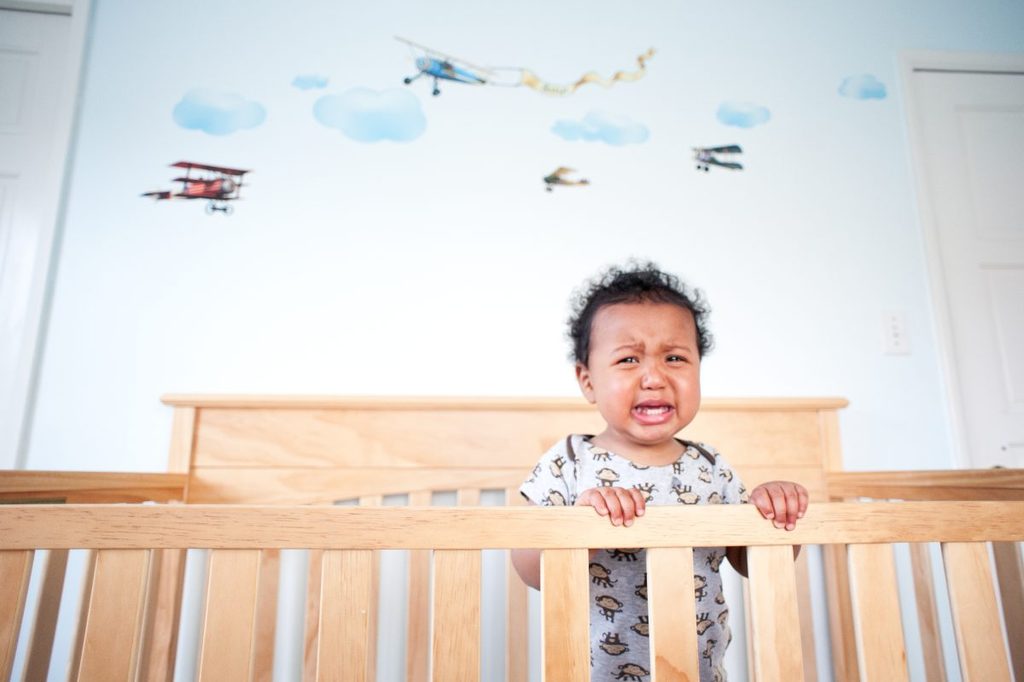Crying is a way for babies to communicate. Babies cry for many reasons, but when a newborn won’t stop crying, it can be extremely worrisome, especially for new parents. Sometimes, when newborns and older babies continue crying, you may feel like joining in. This is certainly true when you have ruled out all the obvious potential reasons for the crying.
The truth is that the first cry you heard in the delivery room was exciting. Your infant finally arrived and was handed to you wailing away. It was a welcome sound. At home, though, when those cries start coming and don’t cease, you may feel frustrated and overwhelmed. Of course, many causes for a crying newborn are straightforward and easy to solve. Others aren’t. So, we have your guide for why babies cry and when to start worrying if they don’t stop.
Newborn won’t stop crying

Those first few days home from the hospital are joyful and stressful. You are still trying to figure out what those cries mean. That feeling of uncertainty will eventually ease but won’t go away entirely because babies cry. Remember, it’s their way of telling you what they need, whether it’s the middle of the night or the day. Don’t worry, though, most often a baby’s cries have a simple solution.
Wet or soiled diaper
When a newborn won’t stop crying, one of the first things you should check is the diaper. A filled diaper isn’t a comfortable feeling, and an infant will most certainly cry when it’s time for a change.
Hunger
If a diaper switch isn’t needed, check the clock. It may be close to feeding time, and your newborn may simply be hungry.
Diaper rash
Babies have sensitive skin and a sore bottom from a diaper rash will most certainly cause crying. So, when you’re checking the diaper, look to see if baby has a diaper rash brewing.
Need to burp
If your newborn has recently been fed and wakes up crying, perhaps they need an additional burp.
Overfeeding
Giving a newborn too much formula or breastmilk can cause a bloated tummy, which will cause discomfort.
Comfort
If you’ve ruled out hunger, a dirty diaper and tummy issues, then your newborn may simple be in need of a cuddle. Gentle rocking and fixing the swaddle may be all baby needs to drift off back to sleep.
Other reasons a newborn won’t stop crying
After exhausting the above checklist, you may need to do a deeper dive to see why your little one continues to cry. These are other reasons why a baby won’t stop crying. So, take a look at these possible reasons.
- Just like kids and adults, a baby can be too hot or too cold. Check to see if you’ve bundled baby too much or not enough.
- Clothing can sometimes cause a baby to cry if it’s too scratchy or there’s a leftover tag digging in somewhere.
- Did baby miss a nap or was naptime interrupted? An overtired baby will often have a lot of difficulty falling asleep.
- Is it too noisy? It always a great idea to get newborns used to the sounds around the house. Loud noises though can startle a baby and cause extended crying. Some babies are more sensitive to noise than others as well.
Fever
When addressing crying, you start with the simple, like checking the diaper and burping before reaching for the thermometer. If you’ve exhausted the checklist and your newborn is still crying, then it may be time to see if baby has a fever. A rectal digital thermometer is the ideal one to use for infants under 3 months of age. Most pediatricians consider a temperature of 100.4 or higher a fever in an infant. If you take your newborn’s temperature and it indicates a fever, give your doctor a call.
Colic
When prolonged crying continues and parents have worked through the list, you may be dealing with colic. Doctors consider colic when a baby cries for three or more hours a day for multiple days during the week without an obvious cause or an illness. Typical soothing methods don’t help calm the crying either. Colic typically happens at the same time of the day or night. Parents of babies with colic consider this the bewitching hours because it’s rough on everyone in the house. The exact cause of colic isn’t known, but it does tend to work itself out around 3- to 4-month mark.
When to call the doctor
If your baby has a fever, don’t hesitate to call your pediatrician. Your newborn could have an ear infection or picked up something from older siblings. Your doctor can guide you on fever remedies and how much to give. The doctor will most likely have you bring your infant in for an office visit.
Another reason to make a doctor’s appointment is if you suspect colic. Symptoms of colic include intense crying, crying that can’t be soothed, crying without an apparent cause, a fussy baby when the crying finally stops, and crying at a predictable time of the day for multiple days. Pediatricians understand new parents worry when a newborn won’t stop crying. So, if you’ve exhausted the checklist and there isn’t a fever, don’t be embarrassed to call your doctor. When you’re stressed out, so if your infant. A call to your pediatrician may just relax both of you.
Older babies won’t stop crying

As you and your baby get to know each other, you will eventually figure out what the different cries mean. You’ll know when your baby is crying from hunger, a wet diaper, or an illness brewing. Seasoned parents even learn to recognize the overtired cries of their infant. Older babies will still cry to eat or if their diaper leaked, but by the time your little one hits the 3-to 4-month mark, they begin to learn how to self-soothe.
So, you won’t get as many of those startled or needs-to-be cuddled cries. What you will get, though, is the teething cry. Teething pain is often a big reason why older babies cry, especially during the night. If your baby is drooling more than usual and you notice the gums are red and swollen, there may be a tooth ready to pop. Don’t disregard the checklist, though. It works for older babies, too. So, always start with the diaper unless baby feels warm to the touch. Then, you may be dealing with a fever.
Final thoughts

When your newborn won’t stop crying, lots of things go through your head. First thoughts typically go to what’s wrong or is baby sick? Most of the time, though, when newborns are crying, the fix is a simple one. Baby needs a change or perhaps the diaper leaked and now your little one needs dry clothes. There may even be a diaper rash coming on or even a tooth.
If you’re trying to figure out why your newborn or older baby won’t stop crying, work your way through our checklist. It starts with the usual before going a little deeper. Remember, if you suspect there’s something else behind your baby’s crying, give your doctor a call. That’s what the office is there for. Crying is a baby’s way of communicating until those words start coming.



